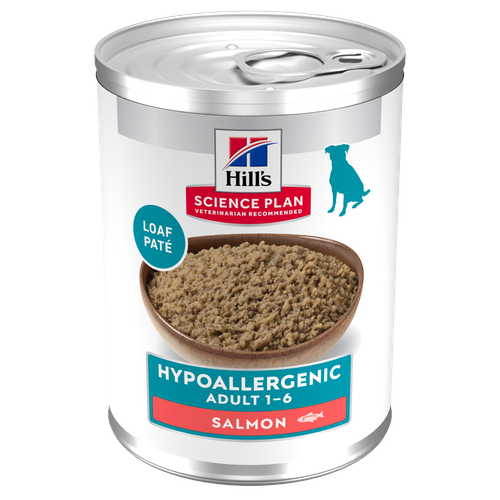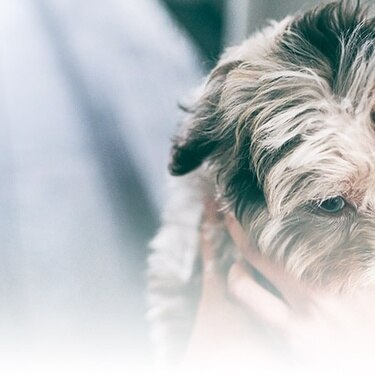
-
Find the right food for your petTake this quiz to see which food may be the best for your furry friend.Find the right food for your petTake this quiz to see which food may be the best for your furry friend.Featured products
 Adult Wet Dog Food with Beef
Adult Wet Dog Food with BeefHill's Science Plan Adult Multipack Wet Dog Food with Chicken, Beef & Turkey are complete premium pet foods for adult dogs from 1 year. Your dog will love these deliciously smooth and savoury minced loaves, formulated for balanced nutrition and overall health.
Shop Now Puppy Food
Puppy FoodHill's Science Plan Puppy Multipack Wet Dog Food with Chicken & Beef are complete premium pet foods for growing puppies from weaning until 1 year old and for pregnant and nursing dogs. Your puppy will love these deliciously smooth and savoury minced loaves, formulated for balanced nutrition and overall health.
Shop Now Mature Adult Dog Food
Mature Adult Dog FoodHill's Science Plan Mature Adult Multipack Wet Dog Food with Chicken & Beef are complete premium pet foods for mature adult dogs from 7 years. Your dog will love these deliciously smooth and savoury minced loaves, formulated to deliver the appropriate amount of energy to support the needs of adult dogs.
Shop NowFeatured products Light Adult Multipack Wet Cat Food with Chicken & Ocean Fish
Light Adult Multipack Wet Cat Food with Chicken & Ocean FishTender chicken chunks in gravy for cats, with L-carnitine and fewer calories for ideal weight management. Packed with high-quality protein, omega-6s, and vitamin E for shiny fur and healthy skin.
Shop Now Mature Adult Wet Cat Food with Chicken
Mature Adult Wet Cat Food with Chicken
Tender chicken chunks in gravy for mature adult cats. Made with easy-to-digest ingredients, high-quality protein for lean muscle maintenance and antioxidant vitamins C+E for optimal health.
Shop Now Adult Multipack Wet Cat Food with Beef, Ocean Fish & Chicken
Adult Multipack Wet Cat Food with Beef, Ocean Fish & ChickenTender chunks in gravy for cats, with high-quality protein to maintain lean muscle. With vitamin E and omega-3s & -6s for healthy skin and balanced minerals to support healthy vital organs.
Shop Now -
Dog
- Dog Tips & Articles
-
Health Category
- Weight
- Food & Environmental Sensitivities
- Urinary
- Digestive
- Joint
- Kidney
-
Life Stage
- Puppy Nutrition
- Adult Nutrition
- Senior Nutrition
Cat- Cat Tips & Articles
-
Health Category
- Weight
- Skin & Food Sensitivities
- Urinary
- Digestive
- Kidney
-
Life Stage
- Kitten Nutrition
- Adult Nutrition
Featured articles The Incredible Science Behind Your Pet's Microbiome
The Incredible Science Behind Your Pet's MicrobiomeLearn what your pet's microbiome is, how it contributes to your pet's gut and overall health, and why nutrition is important in maintaining healthy microbiomes.
Read More Show some love with wet foods: a great choice for pets with health issues
Show some love with wet foods: a great choice for pets with health issuesShow some love with wet foods: a great choice for pets with health issues.
Read More The Right Diet For Your Pet
The Right Diet For Your PetIn people, the right diet is very important. If you are eating the wrong way for your metabolism, activity level, age and lifestyle you could end up with health issues.
Read More -


Grooming your puppy brings you closer
All puppies should be groomed daily, and not merely to improve skin and coat condition. Grooming helps your puppy to get used to being handled, and it allows you to get to know your puppy's body. This is particularly important for detecting any health problems in the early months of your puppy's life. Daily grooming will let you quickly spot skin problems, such as rashes or eczema, and signs of parasites like mites, ticks and fleas. And last but not least, it’s also a great way to enhance the bond between the two of you.
Get going with grooming
Grooming your puppy should be carried out every day, whatever the length of coat, but more attention and time will be needed for longer-haired breeds. Most dogs enjoy being groomed and stroked, especially if started early.
Rewards. With your puppy's own special brush, start grooming for short sessions – just sufficient to touch them once over the whole body – and then gradually lengthen the sessions. When your dog accepts what you're doing and has stood still for a while, stop and give a reward, such as a walk, a game, or a healthy snack. This will help your puppy to realise that standing still brings rewards, which makes grooming easier and more enjoyable for both of you.
Tabletop grooming. If you occasionally groom your puppy on a table, they'll get used to that position, which could be useful when you visit the vet or a groomer. Never leave a dog of any age unattended on a table, though, as they could get badly injured if they fell. If your dog seems scared of being on a table, groom them on the floor.
Sensitive areas. Your puppy's head area is very sensitive, so be extra gentle when you're brushing there. And if you notice any discharge from their ears or eyes, consult your vet.
Wriggling. If your puppy starts to wriggle, hold them firmly with both hands until they stop. Talk to your puppy, offer lots of reassurance, and praise them when they keep still.


Tasty Tips
Keeping your puppy trim
Hair. You might want to trim your puppy's coat now and again, particularly the hair around the eyes, ears, and feet. Be particularly careful in these areas, as wriggly puppies and scissors aren’t always the best mix! If your breed needs a special haircut or trim to keep them looking their best, or if you just want to be on the safe side, get advice from a professional dog groomer.
Nails. Your puppy’s nails will naturally wear down as they start going for walks, digging around in the garden, and exploring. Lots of people think they need clipping, but they shouldn’t do. Many dogs end up having very painful experiences if their nails are cut too short or clipped unnecessarily, and it can cause negative associations with having their feet touched. If you’re ever concerned that your puppy’s nails are too long, ask your vet or nurse to check them for you.
Do puppies need a bath?
Excessive bathing can strip the natural oils and defences from dogs’ coats. Most short- and medium-haired breeds should only need bathing if they get dirty from a really muddy walk, or from rolling in something unsavoury. If you keep longer-haired breeds tangle-free with daily grooming, the same should apply.
Safe bathing: Slipping and sliding might knock your puppy’s confidence around bath time, and may also put them at risk of an injury. If you do decide your puppy needs a bath, put a non-slip rubber mat in the bathtub to keep them safe and secure. And remember – always use a shampoo specially designed for puppies.
Should you consider a groomer?
You can typically groom most dogs yourself most of the time. It's an enjoyable experience that brings you and your pet closer together and you'll be happy to make time for it.
However, if your puppy is going to grow into an adult with a long coat, they’re going to need a little more maintenance. In this case, haircuts and trims might be best carried out by a professional groomer. Obviously, you'll want a groomer who's going to make the grooming enjoyable for your puppy. You'll also want to enquire about their experience and training, and perhaps see other dogs that have been groomed by them.
If you're interested in a professional groomer for your puppy, your vet will be able to advise you and make some recommendations.
Reviewed by Dr. Hein Meyer, DVM, PhD, Dipl-ECVIM-CA and Dr. Emma Milne BVSc FRCVS


One of our staff authors prepared this article for you
Related products

Hill's Science Plan Mature Adult Multipack Wet Dog Food with Chicken & Beef are complete premium pet foods for mature adult dogs from 7 years. Your dog will love these deliciously smooth and savoury minced loaves, formulated to deliver the appropriate amount of energy to support the needs of adult dogs.

Hill's Science Plan Puppy Multipack Wet Dog Food with Chicken & Beef are complete premium pet foods for growing puppies from weaning until 1 year old and for pregnant and nursing dogs. Your puppy will love these deliciously smooth and savoury minced loaves, formulated for balanced nutrition and overall health.

Hill's Science Plan Hypoallergenic Adult Wet Dog Food with Salmon is a complete premium pet food for all adult dogs from 1 year. This savoury tinned loaf is specially formulated for dogs with delicate skin and stomachs. It features a single novel animal protein source and is grain-free.

Hill's Science Plan Adult Multipack Wet Dog Food with Chicken, Beef & Turkey are complete premium pet foods for adult dogs from 1 year. Your dog will love these deliciously smooth and savoury minced loaves, formulated for balanced nutrition and overall health.
Related articles

Many human foods are dangerous to dogs. Read about 5 of the worst toxic food offenders that can kill your dog - and how much it takes to hurt them.

How, when and what to feed your new puppy is an important decision, learn more about the things to consider for feeding your puppy.

Learn effective tips for feeding a dog that's a picky eater and ensure proper nutrition for a finicky eater. Discover tips for pet parents at Hill's Pet UK.

Learn about the potential health risks of a raw diet for dogs and why they aren't the best option for your pup or you.

Put your dog on a diet without them knowing
Our low calorie formula helps you control your dog's weight. It's packed with high-quality protein for building lean muscles, and made with purposeful ingredients for a flavourful, nutritious meal. Clinically proven antioxidants, Vitamin C+E, help promote a healthy immune system.
Put your dog on a diet without them knowing
Our low calorie formula helps you control your dog's weight. It's packed with high-quality protein for building lean muscles, and made with purposeful ingredients for a flavourful, nutritious meal. Clinically proven antioxidants, Vitamin C+E, help promote a healthy immune system.

